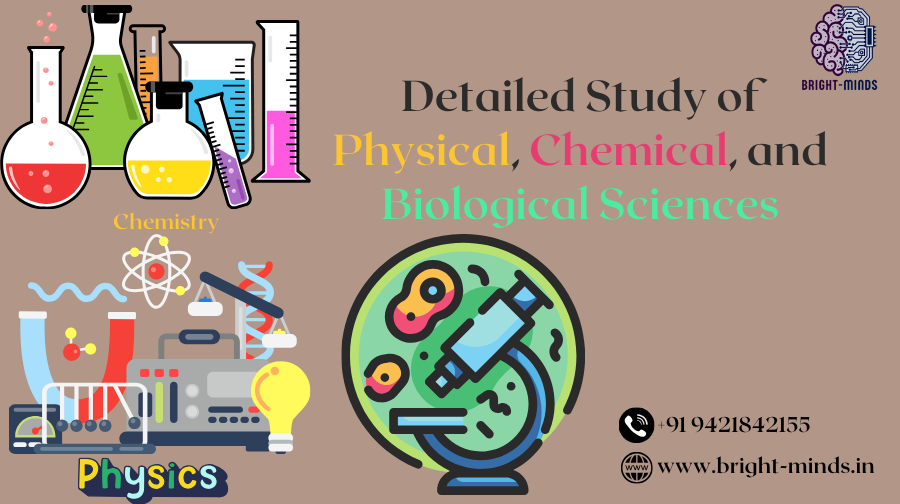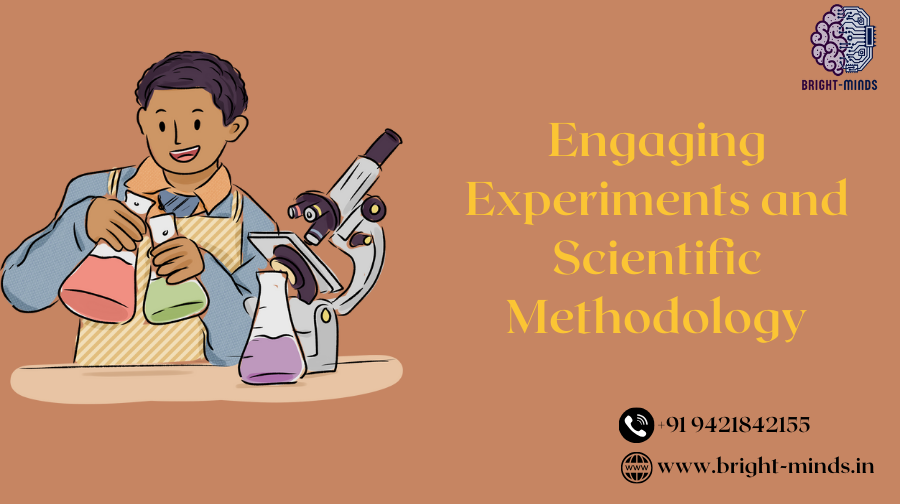
Explore key concept Science for Class 6-8 with engaging lessons, hands-on experiments, and activities to spark curiosity and deepen understanding in young minds
Introduction: The Importance of Science Education in Middle School
Science education during the middle school years Science for Class 6-8 plays a crucial role in shaping young minds. These formative years are when students transition from basic scientific concepts to more complex ideas, laying the foundation for future academic and career pursuits. Science not only broadens their understanding of the natural world but also fosters critical thinking, problem-solving skills, and curiosity.
Core Science Topics Covered in Class 6-8
Science curriculum in Classes 6-8 is designed to introduce students to various branches of science, including physics, chemistry, biology, and environmental science. Here’s an overview of the key topics:
- Class 6: Introduction to Basic Science Concepts
- Physics: Understanding motion, force, work, and energy.
- Chemistry: Introduction to matter, elements, compounds, and mixtures.
- Biology: Study of living organisms, cells, and the human body.
- Environmental Science: Exploring ecosystems, food chains, and the impact of human activities on the environment.
- Class 7: Building on Foundational Knowledge
- Physics: Concepts of heat, temperature, light, and sound.
- Chemistry: Basics of acids, bases, salts, and chemical reactions.
- Biology: Digging deeper into plant biology, animal physiology, and human health.
- Environmental Science: Pollution, conservation of natural resources, and sustainable living.
- Class 8: Preparing for Advanced Studies
- Physics: Exploring electricity, magnetism, and basic mechanics.
- Chemistry: Introduction to the periodic table, chemical bonding, and properties of substances.
- Biology: Genetics, evolution, and the study of microorganisms.
- Environmental Science: Global warming, renewable energy, and biodiversity.
Teaching Strategies for Science For Class 6-8
Effective science teaching in middle school requires a balance between theoretical knowledge and hands-on learning experiences. Here are some strategies that can be employed:
- Interactive Experiments and Practical Sessions
- Conducting experiments in the laboratory helps students understand complex scientific concepts. For example, simple experiments on chemical reactions or physics principles make learning more engaging.
- Use of Visual Aids and Technology
- Visual aids such as diagrams, videos, and animations can simplify difficult topics and make learning more accessible. Digital tools and apps that simulate scientific phenomena can also enhance understanding.
- Project-Based Learning
- Encouraging students to work on science projects fosters collaboration, creativity, and application of knowledge. Projects related to environmental conservation, robotics, or simple machines can be very impactful.
- Incorporating Real-World Applications
- Relating science topics to real-world situations helps students see the relevance of what they are learning. Discussing current events, such as space missions or environmental issues, can stimulate interest and curiosity.
- Encouraging Critical Thinking and Inquiry
- Science is about questioning and exploring. Teachers should encourage students to ask questions, hypothesize, and investigate to find answers. This approach nurtures a scientific temper and a love for learning.
Common Challenges in Science Education and How to Overcome Them
Science for Class 6-8 in middle school can present several challenges, such as:
- Conceptual Difficulties
- Some students may find it hard to grasp abstract scientific concepts. Teachers can overcome this by using analogies, visual representations, and step-by-step explanations.
- Lack of Resources
- Schools with limited access to laboratories or scientific equipment may struggle to provide practical learning experiences. Virtual labs and online resources can be a viable alternative.
- Diverse Learning Abilities
- Students in a classroom may have varying levels of understanding and interest in science. Differentiated instruction, where lessons are tailored to meet individual learning needs, can address this issue.
- Engagement Issues
- Keeping students engaged, especially in a subject perceived as difficult, can be challenging. Interactive activities, field trips, and science fairs can make learning more exciting and enjoyable.
The Role of Parents and Guardians in Science Education
Parents and guardians play a significant role in supporting their child’s science education. Here’s how they can contribute:
- Encouraging Curiosity
- Parents should encourage their children to ask questions about the world around them. Simple activities like observing the night sky or gardening can spark an interest in science.
- Providing Learning Resources
- Access to science books, educational videos, and kits for home experiments can enhance a child’s learning experience.
- Supporting School Activities
- Participation in school science fairs, exhibitions, and competitions should be encouraged. Parents can also volunteer to assist in these activities.
- Monitoring Academic Progress
- Regularly discussing science topics and reviewing homework can help parents stay informed about their child’s progress and areas that need improvement.
Future Trends in Science Education for Middle School Students
The field of science education is constantly evolving, with new trends and methodologies emerging to enhance learning. Some of the future trends include:
- Integration of STEM (Science, Technology, Engineering, and Mathematics)
- There is a growing emphasis on integrating STEM subjects to provide a holistic understanding of how these disciplines intersect and apply to real-world problems.
- Use of Artificial Intelligence and Virtual Reality
- AI-driven personalized learning platforms and VR simulations are becoming popular tools in science education, offering immersive and customized learning experiences.
- Focus on Sustainability and Environmental Science
- With the increasing importance of environmental issues, there is a greater focus on teaching sustainability and eco-friendly practices.
- Project-Based and Inquiry-Based Learning
- These student-centered approaches are gaining traction as they encourage exploration, experimentation, and problem-solving.
- Collaborative Learning and Global Classrooms
- Technology is enabling students to collaborate with peers from around the world, promoting cross-cultural understanding and global scientific perspectives.
Detailed Study of Physical, Chemical, and Biological Sciences:

Science is the foundation of understanding the natural world. For students, a detailed study of physical, chemical, and biological sciences not only builds critical thinking but also prepares them for advanced learning and practical application. This blog aims to explore the fundamental concepts, engaging methodologies, and the importance of these sciences in a student’s academic journey.
Understanding Physical Sciences: The Basics of Forces, Energy, and Earth Sciences
Science for Class 6-8 Physical sciences encompass the study of non-living systems, focusing on understanding the fundamental laws that govern the universe. Key areas include:
- Forces and Motion:
- Newton’s Laws of Motion: Understanding how forces affect the movement of objects.
- Gravitational Forces: The force that attracts objects toward each other, crucial for understanding planetary movements.
- Energy Forms and Transfer: Exploring kinetic and potential energy, and how energy is conserved and transferred between systems.
- Energy:
- Types of Energy: Mechanical, chemical, electrical, and thermal energy, and their practical applications.
- Energy Conservation: The principle that energy cannot be created or destroyed, only transformed.
- Earth Sciences:
- Geology: Study of Earth’s structure, including rocks, minerals, and the processes that shape the planet.
- Meteorology: Understanding weather patterns, climate, and atmospheric phenomena.
- Astronomy: Basics of celestial bodies, the solar system, and the universe.
Engaging Activities in Physical Science:
- Experimentation: Building simple machines to understand force and motion.
- Energy Transfer Projects: Creating models that demonstrate energy conservation.
- Observational Studies: Using tools to observe weather patterns and geological formations.
Delving into Chemical Sciences: Reactions, Elements, and Compounds
Chemical sciences study matter and the changes it undergoes. This field is fundamental for understanding the composition of substances and their interactions.
- Basic Concepts:
- Atoms and Molecules: The building blocks of matter.
- The Periodic Table: Understanding elements and their properties.
- Chemical Bonds: How atoms combine to form molecules.
- Chemical Reactions:
- Types of Reactions: Synthesis, decomposition, single replacement, and double replacement reactions.
- Balancing Chemical Equations: Ensuring the conservation of mass in chemical processes.
- Reaction Rates: Factors that affect the speed of chemical reactions, including temperature and concentration.
- Practical Applications:
- Acids and Bases: Exploring pH levels and their significance in everyday life.
- Organic Chemistry: Introduction to carbon-based compounds and their relevance to life.
- Environmental Chemistry: Understanding the chemical processes that affect our environment.
Engaging Activities in Chemical Science:
- Interactive Labs: Conducting safe chemical reactions to observe changes.
- Elemental Analysis Projects: Creating models of atoms and exploring the periodic table.
- Chemical Bonding Models: Visualizing how different elements interact.
Exploring Biological Sciences: Life, Ecosystems, and Evolution InScience for Class 6-8
Biological sciences focus on the study of living organisms, their functions, and their interactions with the environment.
- Fundamental Concepts:
- Cell Biology: Understanding the structure and function of cells, the basic unit of life.
- Genetics: Exploring DNA, genes, and the principles of heredity.
- Evolution: The process by which species change over time through natural selection.
- Ecosystems and Biodiversity:
- Ecosystem Dynamics: How organisms interact within ecosystems, including food chains and food webs.
- Biodiversity: The variety of life forms on Earth and their importance for ecosystem stability.
- Conservation Biology: Efforts to protect endangered species and preserve habitats.
- Human Biology:
- Anatomy and Physiology: The structure and function of the human body.
- Health and Nutrition: Understanding the role of diet and exercise in maintaining health.
- Disease and Immunity: Exploring how the body defends against pathogens and the importance of vaccines.
Engaging Activities in Biological Science:
- Microscope Labs: Observing cells and microorganisms.
- Genetic Experiments: Using models to understand inheritance patterns.
- Field Studies: Exploring local ecosystems and biodiversity through hands-on research.
Engaging Experiments and Scientific Methodology: Science for Class 6-8

Introduction to Scientific Methodology
Science for Class 6-8 Scientific methodology is the backbone of modern science, offering a structured approach to inquiry that enables students to explore, experiment, and understand the world around them. This method involves making observations, forming hypotheses, conducting experiments, analyzing data, and drawing conclusions. Integrating this approach into education, particularly through engaging experiments, not only enhances students’ understanding of scientific concepts but also fosters critical thinking, problem-solving, and a love for learning.
The Importance of Engaging Experiments in Education
Experiments are a crucial component of science education. They allow students to apply theoretical knowledge in a practical setting, making learning more interactive and memorable. Engaging experiments help to:
- Reinforce Theoretical Concepts: By conducting experiments, students can see the real-world applications of the theories they learn in the classroom. This hands-on approach makes abstract concepts more tangible.
- Develop Critical Thinking: Experiments encourage students to think critically about the scientific process, question their assumptions, and explore different possibilities.
- Foster Curiosity and Creativity: Engaging experiments stimulate curiosity and creativity, as students are often required to design their own experiments or modify existing ones to test new hypotheses.
- Build Collaborative Skills: Many experiments are conducted in groups, helping students develop teamwork and communication skills.
Core Components of Scientific Methodology
To effectively teach scientific methodology through engaging experiments, it is important to understand its core components:
- Observation: This is the first step in the scientific method, where students learn to observe phenomena and gather information. Observations lead to questions that form the basis of further inquiry.
- Hypothesis Formation: After making observations, students are encouraged to form hypotheses—educated guesses that can be tested through experiments. This step is critical in developing a student’s ability to think logically and predict outcomes.
- Experimentation: The heart of scientific methodology lies in experimentation. Students test their hypotheses by conducting experiments under controlled conditions. They learn to manipulate variables, measure results, and record data accurately.
- Data Analysis: Once the experiment is conducted, students analyze the data to determine whether their hypothesis is supported or refuted. This step involves critical thinking, as students must interpret results and consider alternative explanations.
- Conclusion: Based on the data analysis, students draw conclusions about their hypothesis. They learn to communicate their findings clearly, both in written reports and oral presentations.
- Replication: To validate results, students may need to repeat experiments or have others replicate them. This step emphasizes the importance of accuracy and reliability in scientific research.
Conclusion
A detailed understanding Science for Class 6-8 in physical, chemical, and biological sciences equips students with the knowledge and skills they need to succeed in future academic and professional endeavors. Engaging activities and a strong grasp of the scientific method foster critical thinking and problem-solving abilities, essential for success in any field. By nurturing curiosity and providing hands-on experiences, educators can inspire the next generation of scientists, engineers, and informed citizens.
you may be interested in this blog here:-
Numeracy Skills for Pre-Primary Building a Strong Foundation
